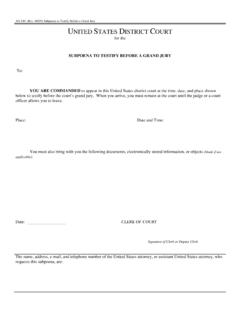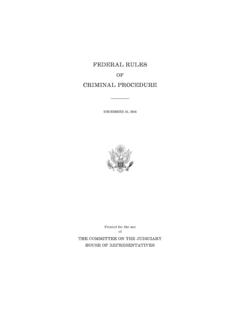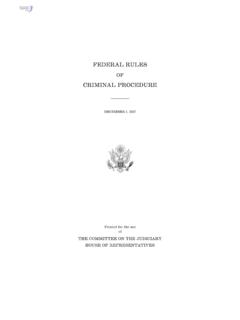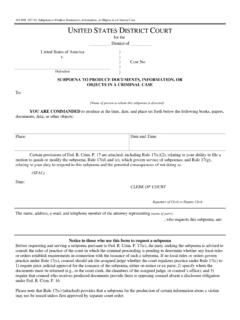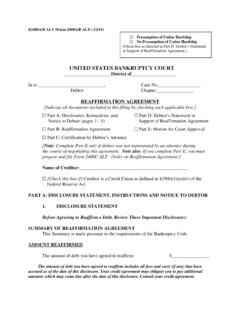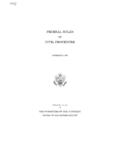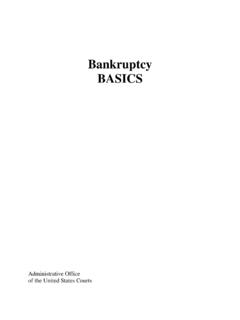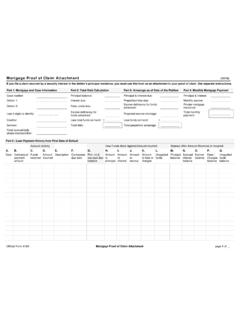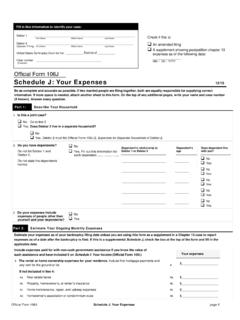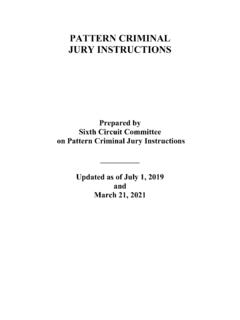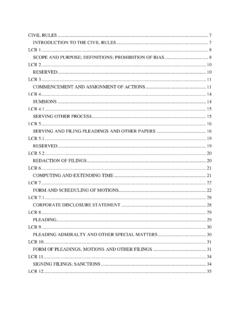Transcription of Manual for Complex Litigation, Fourth - United States Courts
1 Manual for Complex Litigation, FourthFederal Judicial Center 2004 Cite asManual for Complex Litigation, Fourth , ____orMCL 4th ____Manual for Complex Litigation, FourthBoard of EditorsJudge Stanley Marcus (Ct. of App., 11th Cir.), chairJudge John G. Koeltl ( ) Judge Barefoot Sanders ( Tex.)Judge J. Frederick Motz (D. Md.)Sheila Birnbaum, Esq. ( , )Judge Lee H. Rosenthal ( Tex.)Frank A. Ray, Esq. (Columbus, Ohio)Judge Fern M. Smith ( Cal.),director, federal Judicial Center 1999 2003 federal Judicial Center 2004 The Manual for Complex Litigation, Fourth has been produced under the aus-pices of the federal Judicial Center. The analyses and recommendations arethose of the Manual s Board of page inserted for correct paginationwhen printing double-sided xviiAcknowledgments xixIntroduction 1 Part I: Overview 5 10. General Principles Judicial Supervision Early Identification and Control Assignment Plan Recusal/Disqualification Other Judges Related Litigation Effective Management Supervisory Referrals to Magistrate Judges and Special Masters Sanctions General Principles Sources of Authority Considerations in Imposing Types Procedure Role of Counsel Responsibilities in Complex Litigation Coordination in Multiparty Litigation Lead/Liaison Counsel and Committees Organizational Structures Powers and Responsibilities Compensation court s Responsibilities Related Litigation Withdrawal and Disqualification 28 11.
2 Pretrial Procedures Preliminary Matters Scheduling the Initial Conference Interim Measures Prediscovery Disclosure Conferences Initial Conference and Orders case -Management Plan Scheduling Order Class Actions Settlement Subsequent Conferences Attendance Management of Issues Relationship to Discovery Pleading and Motion Practice Identifying, Defining, and Resolving Issues Summary Judgment 46 Manual for Complex Litigation, Discovery Relationship to Issues Planning and Control Discovery Plan/Scheduling Conference Limitations Other Practices to Save Time and Expense Resolution of Discovery Disputes Privilege Claims and Protective Orders Claims of Privilege/Full Protection Limited Disclosure/Protective Orders Allocation of Costs Documents Identification System Preservation Rule 34 Requests/Procedures for Responding Document Depositories Evidentiary Foundation for Documents Discovery of Computerized Data Discovery from Nonparties Depositions Limitations and Controls Cost-Saving Measures Deferred Supplemental Depositions Scheduling Coordination with Related Litigation Control of Abusive Conduct Interrogatories Purposes Limitations Responses Other Practices to Save Time and Expense Stipulations of Fact/Requests for Admission
3 Stipulations of Fact Requests for Admission Statements of Contentions and Proof Requests for Judicial Notice Disclosure and Discovery of Expert Opinions Trial Experts Consulting Experts court -Appointed Experts Special Problems Government Investigations/Grand Jury Materials Summaries Sampling/Opinion Surveys Extraterritorial Discovery Special Referrals court -Appointed Experts and Technical Advisors Special Masters Magistrate Judges Under 28 636(b)(1) Other Referrals Final Pretrial Conference/Preparation for Trial Date and Place of Trial Reevaluation of Jury Demands Structure of Trial Consolidation Separate Trials Special Verdicts and Interrogatories Procedures to Expedite Presentation of Evidence Statements of Facts and Evidence Pretrial Rulings on Objections Disclosure of and Objections to Digital Evidence and Illustrative Aids Limits on Evidence Use of Courtroom Technology to Facilitate Evidence Presentation Proposed Jury Instructions Briefs and Final Pretrial Motions Final Pretrial Order 129 12.
4 Trial Administration Trial Schedule Courthouse Facilities Managing Exhibits Transcripts Conferences During Trial Conduct of Trial Opening Statements Special Procedures for Multiparty Cases Advance Notice of Evidence and Order of Proof/Preclusion Orders The Judge s Role Presentation of Evidence Glossaries/Indexes/Demonstrative Aids Use of Exhibits Depositions Summaries Editing, Designations, and Extracts Presentation/Videotaped Depositions Alternative Means of Presenting Testimony Sequencing of Evidence and Arguments Judicial Control/Time Limits Jury Trials Impaneling the Jury Size of the Venire and Panel Voir Dire Peremptory Challenges Juror Note Taking/Notebooks/Questions Note Taking Juror Notebooks Juror Questions Jury Instructions General Principles Preliminary Instructions Interim and Limiting Instructions Final Instructions Jurors Use of Exhibits During Deliberations Supplemental Instructions and Readbacks Avoiding Mistrial Verdicts Special Verdicts and General Verdicts with Interrogatories Judgment as a Matter of Law Return of Verdict 163 Manual for Complex Litigation.
5 Nonjury Trials Adopted Prepared Statements of Direct Testimony Findings of Fact and Conclusions of Law Procedures When Combined with Jury Trial Inability of Judge to Proceed 166 13. Settlement Trial Judge s Role General Principles Timing/Relationship to Discovery Specific Techniques to Promote Settlement Review and Approval Alternative Processes to Encourage Settlement Special Problems Partial Settlements Agreements Affecting Discovery Side Agreements Ethical Considerations 180 14. Attorney Fees Eligibility for court -Awarded Fees Types of Cases Overview Common-Fund Cases Percentage-Fee Awards Lodestar-Fee Awards Statutory-Fee Cases Proceedings to Award Fees Setting Guidelines and Ground Rules Selecting Counsel and Establishing Fee Guidelines Staffing Maintaining Adequate and Comprehensible Records Submission of Periodic Reports Compensation for Designated Counsel Reimbursement of Expenses Motion for Attorney Fees Contents of the Fee Motion Timing Supporting Documentation and Evidence Discovery Judicial Review/Hearing and Order Judicial Review Hearing and Order 207 15.
6 Judgments and Appeals Interlocutory Appeals When Permitted Proceedings While Appeal Pending Entry of Final Judgment Disposition of Materials 213 Part II: Special Problems 215 20. Multiple Jurisdiction Litigation Related federal Civil Cases Cases in Same court Cases in Different federal Courts Multidistrict Transfers Under Section 1407 Requests for Transfer During Period of Transfer Remand Coordination Between Courts Related criminal and Civil Cases Related State and federal Cases Coordination Identifying the Need and Opportunity Threshold Steps Specific Forms of Coordination Jurisdictional Conflicts 238 21. Class Actions Precertification case Management Initial case -Management Orders Precertification Communications with the Proposed Class Standards for Class Certification and Precertification Discovery Certifying a Litigation Class Certifying a Settlement Class Timing of the Certification Decision Precertification Discovery Precertification Discovery into the Rule 23(a) Requirements Precertification Discovery into the Rule 23(b) Requirements Relationship with Other Cases Pending During the Precertification Period Deciding the Certification Motion Certification Hearings and Orders Type and Definition of Class Type of Class Definition of Class Role of Subclasses Role of Issues Classes Multiple Cases and Classes.
7 The Effect on Certification Appointment of the Class Representatives Appointment of Class Counsel Criteria for Appointment Approaches to Selecting Counsel Procedures for Appointment Interlocutory Appeals of Certification Decisions Postcertification Communications with Class Members Notices from the court to the Class Certification Notice Settlement Notice Other court Notices Communications from Class Members Class Members Right to Elect Exclusion Communications Relating to Damage or Benefit Claims Other Communications from Class Members Communications Among Parties, Counsel, and Class Members Postcertification case Management Discovery from Class Members Relationship with Other Cases Trials 306 Manual for Complex Litigation, Settlements Judicial Role in Reviewing a Proposed Class Action Settlement Issues Relating to Cases Certified for Trial and Later Settled Issues Relating to Cases Certified and Settled at the Same Time Criteria for Evaluating a Proposed Settlement Procedures for Reviewing a Proposed Settlement Obtaining Information Preliminary Fairness Review Notice of Fairness Hearing Fairness Hearing Findings and Conclusions Role of Other Participants in Settlement Review Role of Class Counsel in Settlement Role of Class Representatives in Settlement Role of Objectors in Settlement Role of Magistrate Judges, Special Masters.
8 And Other Judicial Adjuncts in Settlement Issues Raised by Partial or Conditional Settlements Partial Settlements Conditional Settlements Settlement Administration Claims Administrator or Special Master Undistributed Funds Attorney Fee Awards Criteria for Approval Procedure for Reviewing Fee Requests Motions Notice Objections Information Supporting Request and Discovery for Fee Requests Required Disclosures Hearing and Findings Use of Special Masters or Magistrate Judges 340 22. Mass Torts Introduction Initial Issues in Mass Tort Suits Multiple Filings in federal District Courts Aggregating Claims Criteria Advantages and Disadvantages of Aggregation Timing of Aggregation Decisions Obtaining Information About Common Issues and case Values Test Cases case Characteristics Role of Different State Laws Trial Plans Intradistrict Assignment to a Single Judge Interdistrict Transfer (Including MDL)
9 Denial of Transfer Insufficient Common Facts Procedural Alternatives Geographical Diversity and Economy Maturity of Litigation Authority of a Judge Pending Decision by the MDL Panel The Tasks of an MDL Transferee Judge The Task of the Transferor Judge Following Remand After MDL Proceedings Multiple Filings in State and federal Courts Multiple Filings in District and Bankruptcy Courts Venue, Transfer, and Consolidation Venue and Transfer Consolidation and Reassignment Withdrawing the Reference Dividing the Labor Among Judges MDL Transferee Judge Other Judges Bankruptcy Appeals Coordinating and Consolidating Tort Claims and Related Cases Claims Against the Debtor Claims Against Other Defendants Consolidation of Cases Transfer of Related Cases of Nondebtor Defendants Expanding the Automatic Stay or Enjoining Related Cases Providing Representation for Future Mass Tort Claimants Estimating the Value of Mass Tort Claims Negotiating a Reorganization Plan Discharging Future Claims Confirming a Reorganization Plan case -Management Orders Initial Orders Organization of Counsel Subsequent case -Management Orders Adding Parties Pleadings and Motions Deferred Docketing Issue Identification and Development Electronic
10 Communications Class Actions in Mass Tort Cases Background Post-Amchem Class Certification Post-Ortiz Mandatory Limited Fund Class Settlements Medical Monitoring Class Actions Issues Classes Identify the Issues Determine Applicable Law Identify a Limited Set of Laws Subclasses to Reflect Differences in State Law Determine Separability of Common Issue Establish a Trial Plan Assess the Overall Impact Discovery Sampling Initial Disclosures Interrogatories Depositions: New Parties Documents Physical Evidence Experts and Scientific Evidence Settlement and Trial Judicial Role and Settlement 446 Manual for Complex Litigation, Review of Settlement in Mass Tort Class Actions Class Certification in a Settlement Context Fairness, Adequacy, and Reasonableness of the Settlement Criteria for Evaluating the Merits of a Proposed Settlement Gathering Information and Conducting a Fairness Hearing Evaluating Nonmonetary Benefits Presenting the Decision Awarding and Allocating Attorney Fees Trial 463 23.
